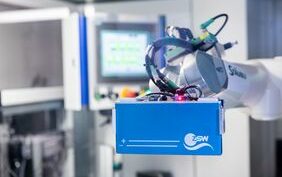Researchers at the Center for Solar Energy and Hydrogen Research Baden-Württemberg (ZSW) in Germany are to bridge the gap between prototype demonstrations and the industrial, mass production of large-format lithium-ion cells.
Launched earlier this month, the ZellkoBatt project will look at reducing the costs of components and digitising manufacturing processes for cells to be used in automotive applications.
The research will include large-format pouch and PHEV-2 cells up to 80Ah and 21700 cylindrical cells.
Results from the project will be transferred to the near-series ZSW research production line, which has been in operation since 2014, to be developed for commercialisation.
The Federal Ministry of Education and Research is funding the project with €12.7 million ($14 million) over two years. The Federal government aims to have 10 million electric vehicles on Germany’s roads by 2030.
Dr. Margret Wohlfahrt-Mehrens, head of Battery Research at the ZSW, said: “Electromobility will change the supply industry for the automotive industry very much.
“We have to do everything we can to accelerate the development and production of battery systems in order to ensure the future viability of the automotive industry in Germany.
“With the ZellkoBatt project, we are expanding our existing technology infrastructure to accelerate the transfer of innovative battery cells to industrial, mass production.”
ZSW will also look at the possibilities of digitising cell production using a cloud-based data interface to further research purposes, such as modelling and simulation of production or for intelligent process control through machine learning.
Last year, Chinese battery giant Contemporary Amperex Technology (CATL) broke ground on its German battery manufacturing plant— the first time the company has expanded beyond its China borders.












